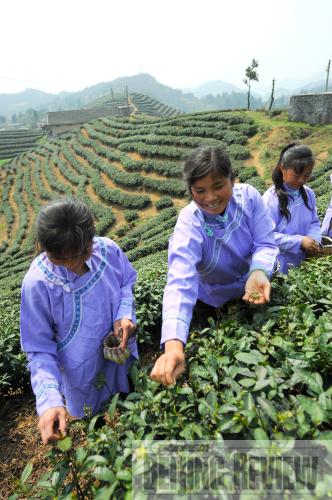|
 |
|
HAPPY FARMWORK: Three rural women of Guizhou Province pick spring tea (LIU XU) |
Gazing proudly at his 9-year-old son who was seated beside him, Meng Renjun cracked a big smile. He patted the boy on the shoulder.
"He is very great," Meng said. "He placed No.1 in the school exam."
Meng, a 47-year-old farmer who lives in the town of Sankeshu in Kaili City, Guizhou Province, welcomed his first child, a daughter, 19 years ago. The couple wanted more children, but his wife, 43-year-old Zhang Yingju, suffered repeated miscarriages. They went without another child until they received help from officials in Kaili City's Population and Family Planning Commission, who arranged for them to go to a hospital so the child could be delivered safely. The couple came home nine years ago with a healthy son.
"We all go to hospitals to give birth," Zhang said. She said that her elders' poverty forced them to deliver their children at home. They only went to hospitals when their labor became difficult.
This is not a rare phenomenon in the rural part of Guizhou, especially in the areas that ethnic minorities call home.
Zhang's neighbor, 72-year-old Zhang Zhizhen, gave birth at home to eight children-four sons and four daughters. Only one son survived. After the son got married, his wife delivered three children at home. None survived. His final two children were delivered in the hospital and both survived.
Government agencies in Guizhou Province are trying to decrease infant mortality and improve access to health services. They embarked on an educational campaign to improve the knowledge of expecting mothers and, since 2005, have included hospital child birth fees in the rural cooperative medical system, which can be reimbursed. This move largely relieved the economic burdens of childbirth for rural women.
Seven million women of childbearing age received the health care service in 2008, more than 95 percent of all the women of childbearing age in the province, according to data from the Guizhou Population and Family Planning Commission.
To lift the status of rural women, officials also plan to raise their income along with improving their access to maternal healthcare.
In March 2006, the National Population and Family Planning Commis-sion of China and the Japanese International Cooperation Agency conducted a project to help the poor in two minority-dominated, poverty-stricken counties in Guizhou Province. The project aims to improve rural women's living conditions and income by giving skills training, family care support and offering funds.
Zhongzhai Village, which is home to 627 people of the Miao ethnic group, is included in the project.
Song Cuifang, a 25-year-old woman with a 2-year-old son, sees the changes that the project has brought to the village. Experts come to the village to give trainings on healthcare, preventing infectious diseases and agricultural skills. According to village head Li Jun, experts have run 15 terms of training courses and 427 villagers have attended.
"We didn't have an asphalt road before and now the conditions are much better," said Song. "We had to get up very early in the past to carry water since we didn't have tap water, but now we do in every household." Song also said that they used to burn firewood for cooking, which caused severe deforestation. Now everyone in the village uses methane gas, which is more environmentally friendly.
Song said she personally benefited the most from skills training she received in planting tea. "In the past, we knew almost nothing about the skill of planting tea, so we were unable to raise high-quality tea," she said. "My family could only earn less than 1,000 yuan ($146) from tea sales before. In the last two years, we raised several thousand yuan from it, and this year we plan to make even more."
Each place involved in the project gets some funding in the form of interest-free loans to farmers. Since the funding is limited, only a small number of households can receive it during the first round. But after the money is returned, other households can take out a loan. Each household is eligible for 2,000-3,000 yuan ($293-$439). So far 30 households in Zhongzhai Village have taken out loans, totaling 70,000 yuan ($10,244).
"Although it is not a lot of money, the loans can bring economic benefits to farmers in this less-developed place," said Party Secretary Li. A farmer, he offered as an example, used the 2,000 yuan to purchase an ox. After half a year, the ox was sold for 4,800 yuan ($702), which he then used to get two oxen. | 